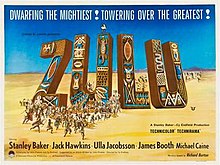| Zulu | |
|---|---|
 UK cinema release poster | |
| Directed by | Cy Endfield |
| Screenplay by | John Prebble Cy Endfield |
| Story by | John Prebble |
| Produced by | Stanley Baker Cy Endfield |
| Starring | |
| Narrated by | Richard Burton |
| Cinematography | Stephen Dade |
| Edited by | John Jympson |
| Music by | John Barry |
Production company | Diamond Films |
| Distributed by | Paramount Pictures |
Release date |
|
Running time | 139 minutes |
| Country | United Kingdom[1] |
| Language | English |
| Budget | US$ 1,720,000. (666,554. GBP)[2] or £653,439[3] |
| Box office | $8 million (US)[4] |
Zulu is a 1964 British epic adventure action war film depicting the Battle of Rorke's Drift between a detachment of the British Army and the Zulu in January 1879, during the Anglo-Zulu War. Some 150 British soldiers at a remote outpost, 30 of whom were sick and wounded, held off a force of 4,000 Zulu warriors.
The film was directed and co-written by American screenwriter[5] Cy Endfield. He had moved to the United Kingdom in 1951 for work after being blacklisted in Hollywood. It was produced by Stanley Baker and Endfield, with Joseph E. Levine as executive producer. The screenplay was by Endfield and historical writer John Prebble, based on Prebble's 1958 Lilliput article "Slaughter in the Sun".
The film stars Stanley Baker and introduces Michael Caine in his first major role, with a supporting cast that includes Jack Hawkins, Ulla Jacobsson, James Booth, Nigel Green, Paul Daneman, Glynn Edwards, Ivor Emmanuel, and Patrick Magee. Zulu chief Mangosuthu Buthelezi (a future South African political leader) played Zulu King Cetshwayo kaMpande, who was his great-grandfather. The opening and closing narration is spoken by Richard Burton.
The film was first shown on the 85th anniversary of the battle, 22 January 1964, at the Plaza Theatre in the West End of London. Zulu received widespread critical acclaim, with praise for the sets, soundtrack, cinematography, action sequences, and the cast's performances, particularly Baker, Booth, Green, and Caine. The film brought Caine international fame. In 2017, a poll of 150 actors, directors, writers, producers, and critics for Time Out magazine ranked it as the 93rd best British film ever.[6]
- ^ "Zulu (1963)". British Film Institute. Archived from the original on 12 July 2012. Retrieved 28 July 2014.
- ^ Film Finance, Ltd. (Production Bond Company) Statement of Production Costs #15, week ending, 18 October 1963
- ^ Chapman, J. (2022). The Money Behind the Screen: A History of British Film Finance, 1945-1985. Edinburgh University Press p 360
- ^ "Film giants step into finance". The Observer. London, UK. 19 April 1964. p. 8.
- ^ Stafford, Jeff. "Zulu". Turner Classic Movies.
- ^ "The 100 best British films". Time Out. Retrieved 26 October 2017